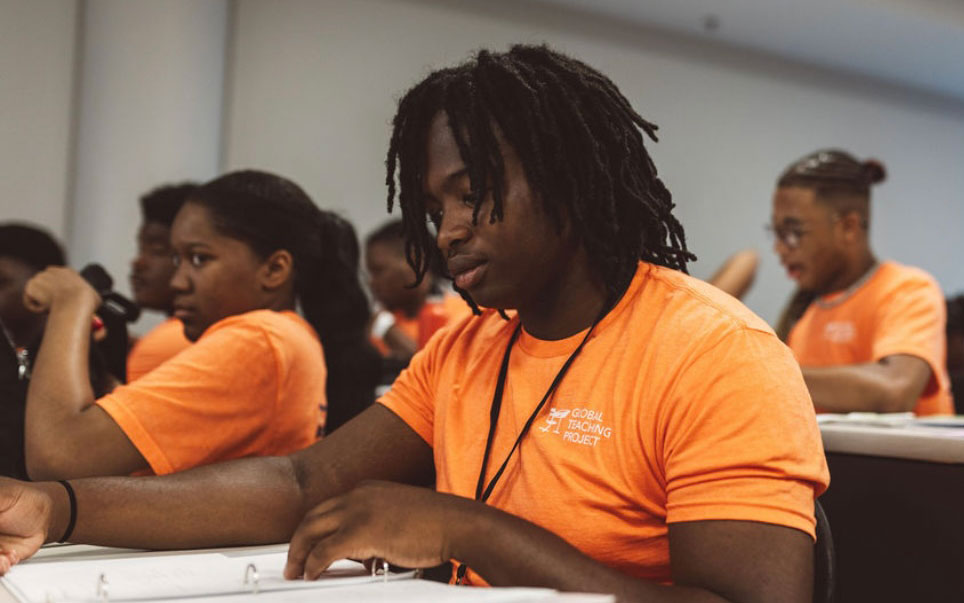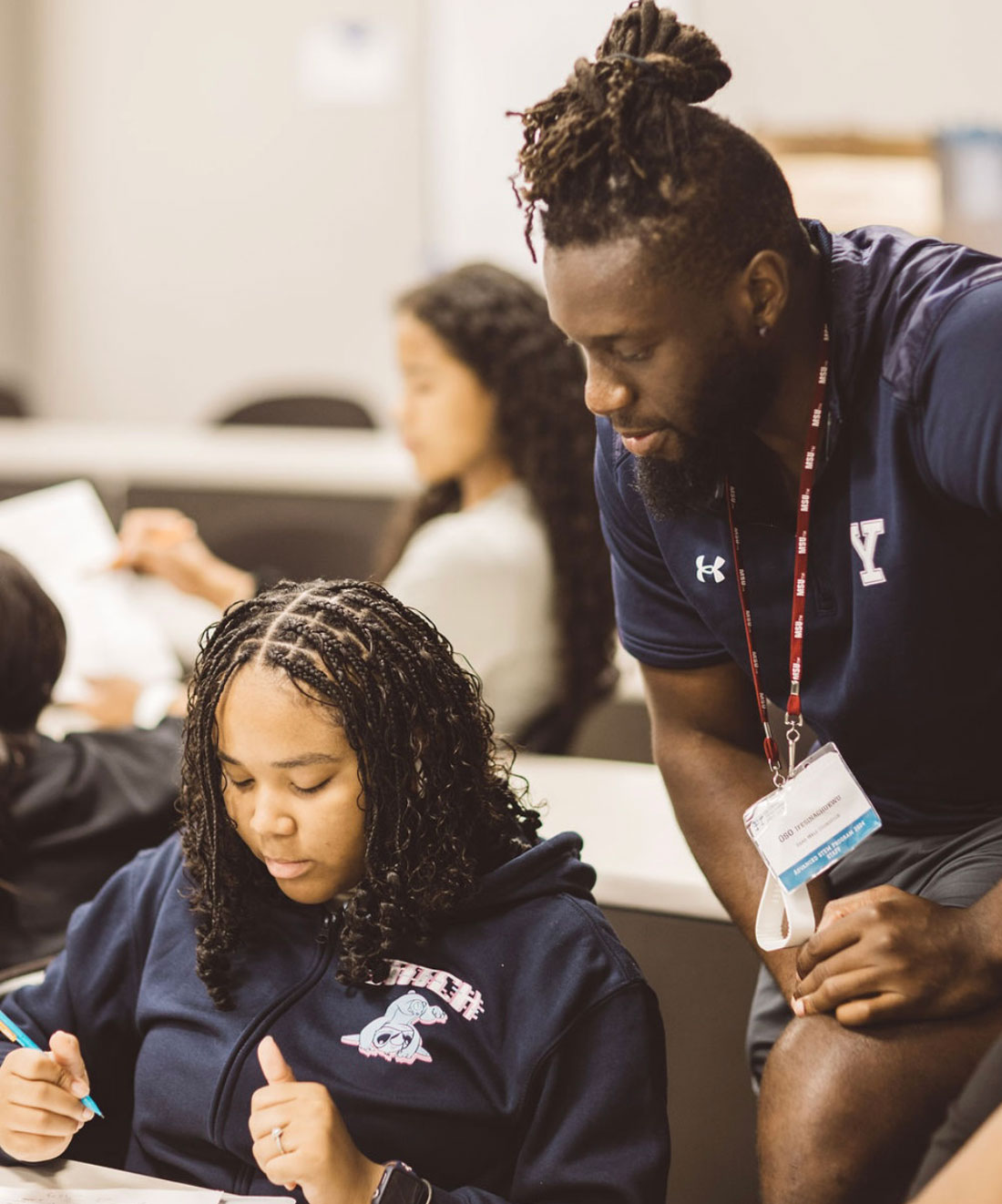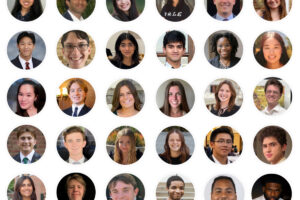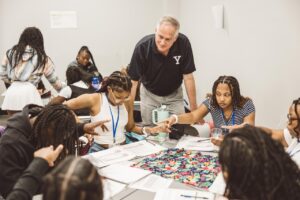
Delta Students, School Excel in GTP AP Curriculum
The Global Teaching Project provides promising students in rural, high-poverty Mississippi communities access to advanced STEM classes their schools otherwise may not offer. Last year, GTP worked with hundreds of students in 39 schools to offer four classes—AP Biology, AP Computer Science Principles, AP Physics 1, and AP Statistics.
Each of those schools have success stories that emphatically affirm GTP’s premise—every community has bright students with the aptitude and work ethic needed to excel academically, if provided the opportunity and strong support.
John Knighten and Angel Lewis, seniors at Madison S. Palmer High School in Marks, recently achieved two of the highest AP Biology scores in the state, placing them among the top one-half of one percent of all Mississippi high school students and earning them college credits that may be used at universities across the country.
John and Angel’s achievement also highlights the remarkable gains in recent years at Palmer, now in its eighth year working with GTP. During that period, Palmer, which had been near the bottom of state accountability ratings, rose to an “A” ranking, the highest score possible for a Mississippi school.
Palmer is the sole public high school in Quitman County in Mississippi’s Delta region—by many measures, the nation’s most impoverished area. Four days before he died, Rev. Martin Luther King, Jr. delivered his final sermon, in which he decried poverty across America, but singled out Marks, stating, “I was in Marks, Mississippi, the other day, which is in Quitman County, the poorest county in the United States. I tell you, I saw hundreds of little black boys and black girls walking the streets with no shoes to wear.”
Dr. King himself directed that the Poor People’s Campaign, a march to Washington to advocate for opportunity, begin at Marks. And so it did. Just weeks after his assassination, the Marks “Mule Train” headed east, composed of wagons marked by messages of hope at a time of great despair.

The educators and students at Palmer High School, together with GTP, are building on that legacy of promoting opportunity. Quitman County’s challenges persist—the school age poverty rate, 48.3 percent, is more than triple the national rate. Yet Palmer’s educators and students are working, with considerable success, to overcome those challenges and create a better future for themselves and their community.
Ms. Velma Wilson, Director of Economic Development for Quitman County, heard Dr. King speak from the pulpit of what is now the historic Eudora AME Zion Church in Marks over 50 years ago, when she herself was a high school student. Ms. Wilson has since been committed to promoting economic advancement through quality education, and welcomes GTP’s role. “GTP recognized what our students are capable of achieving, and provided the means for them to do so. The example of GTP’s AP classes also helped elevate the overall performance of our high school.”
The Global Teaching Project has worked closely with Palmer since 2017 to provide a specific, and critical, opportunity—access to advanced STEM courses that promising students need to achieve their full potential—at no cost to schools or students’ families.
Advanced Placement courses prepare students for college rigor, enhance admission prospects, and potentially reduce college costs by enabling students to earn college credits prior to matriculation. A federal study found disparate access to APs “aggravate the achievement gaps” afflicting low-income communities, but those disparities remain vast—99 percent of large, low-poverty (fewer than 25 percent of students qualify for free or reduced lunch) offer APs, but only 11 percent of small, high-poverty (75 percent or more free and reduced lunch) do so.
Prior to working with GTP, Palmer High School offered no APs in any subject. Through GTP, it now offers 3—AP Biology, AP Computer Science Principles, and AP Physics 1.
Angel, who plans to attend Spelman College and become a neurosurgeon, credits GTP’s annual summer preparatory program at Mississippi State with helping her understand Biology’s broad scope, and prepare for the rigor of an AP course. “I learned so much. I wasn’t aware that there was so much more to Biology, such as standard deviations and math. I enjoy math, so I am excited about that.”
John, who also attended the summer residential program, added, “I felt it made me very well prepared.” He also learned from the hands-on labs. “We modeled a membrane using a soapy solution” to examine diffusion, and learned sampling techniques to determine the composition of biomes.

Angel and John also praised GTP’s tutors—STEM majors from Harvard, Virginia, Yale, and other prominent universities who work with students in person at university instructional programs, and virtually throughout the school year, typically twice each week by videoconference. Angel stated, “Lasya [Cheruvu of Rutgers, Palmer’s lead AP Biology tutor] is an amazing tutor. She doesn’t do all the work by herself. We have a hand in it.”
Most of all, students benefit from the efforts of many dedicated educators at Palmer.
Ms. Katherine Jennings, the teacher who leads Palmer’s AP Biology class, uses the course to go beyond what is taught in the introductory Biology class students took previously. She values the support GTP provides, including regular tutoring sessions and episodic in-person visits to the rural school. “It means a lot to be checked on like that.”
Now-retired Superintendent Evelyn Jossell launched the partnership with GTP, which continues under the leadership of Superintendent Walter Atkins and Principal Tukiiya Stephens. Dr. Andrea Shegog, Palmer’s lead counselor, has been integral to the program since inception. Classroom instructors Mr. Baxter Swearengen and Mr. Scott Anderson, along with Ms. Jennings, work hard so their students learn each day.
As for John and Angel, they are just getting started. Both are now taking AP Physics 1, for which they again prepared at GTP’s summer program. For years, that course has had the lowest scores nationally of any of 42 AP-tested subjects—fewer than 0.3 percent of Mississippi students even attempt to take that exam. Yet John and Angel, as well as about a dozen classmates, have embraced that challenge. History suggests they will be up to the task.



